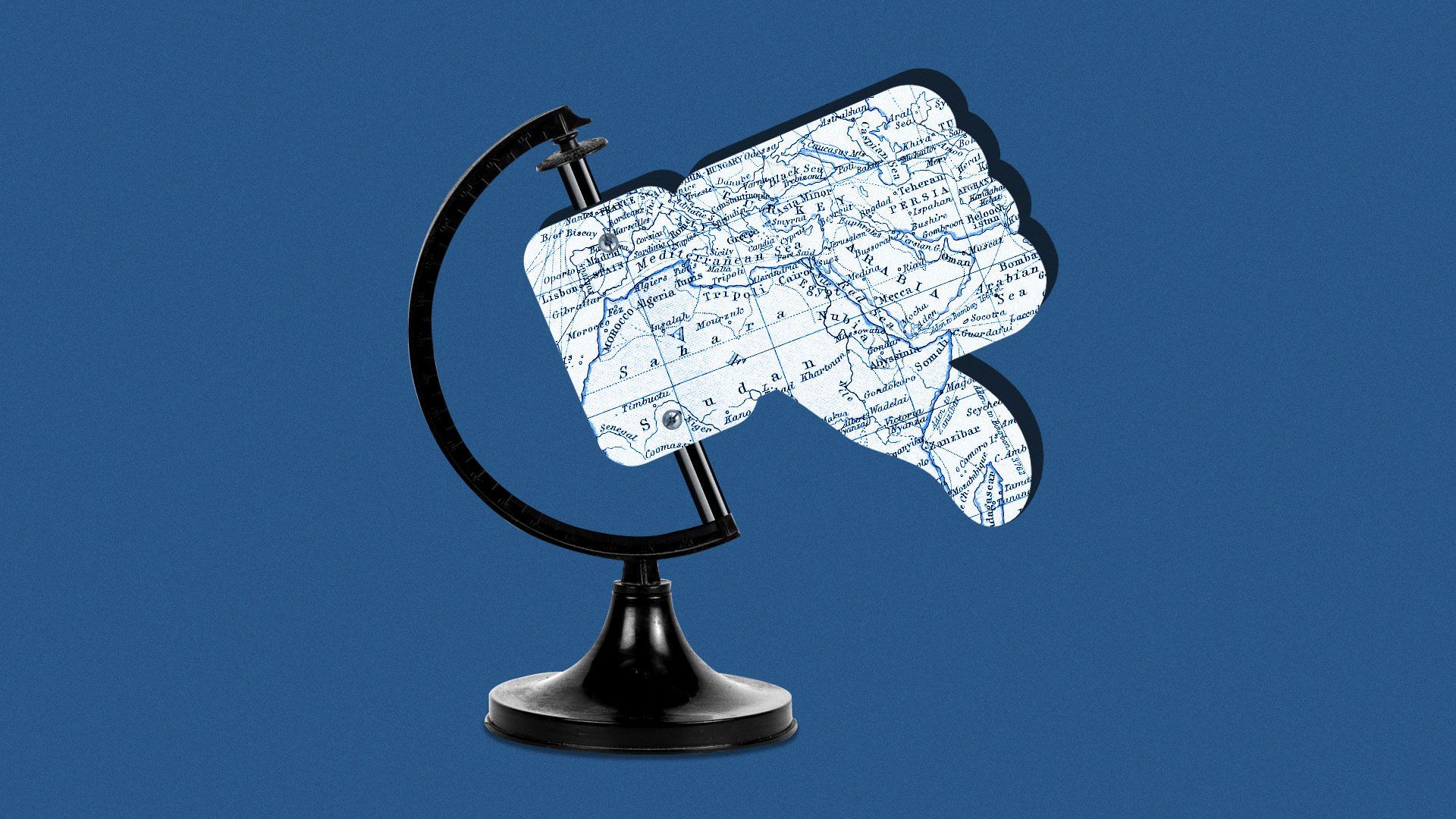Governments around the globe find ways to abuse Facebook
Add Axios as your preferred source to
see more of our stories on Google.

Illustration: Eniola Odetunde/Axios
While regulators in the U.S. and Europe circle Facebook and scrutinize its every move, in much of the rest of the world its platform remains ill-defended against election tampering, human rights violations, autocratic misuse and other information disorders.
The big picture: The consequences of this void are huge yet hardly acknowledged by Western regulators, who are most concerned with the misinformation spreading in their own backyards.
Driving the news: Activists have begun to sound the alarm on misinformation problems surrounding elections in some African nations, Bloomberg reports.
- In Guinea, for example, social media platforms are a tool for the government to dominate campaign narratives, according to Bloomberg.
- Some African governments have used the massive spread of disinformation and social media-related violence as an excuse to shut down the internet entirely.
Recent takedowns of coordinated inauthentic behavior campaigns in countries like Myanmar and the Philippines show ways that autocrats use platforms like Facebook to undermine their own populations to retain power.
- Facebook said earlier this month that it removed a coordinated inauthentic behavior campaign that was linked to members of the Myanmar military and targeted at domestic audiences. It's the 7th such campaign the company has caught in Myanmar so far.
- Facebook said in September that it removed a coordinated inauthentic behavior campaign in the Philippines that was linked to the nation's government, and focused on domestic Filipino audiences.
Social giants argue that the open access to their platforms can also be used to promote democracy, citing events like the Arab Spring.
- Facebook has conceded that it can't guarantee that its platform is good for democracy, but it has said that is has a "moral duty" to understand how its technology is affecting democracy, for better or worse.
Yes, but: As American-run companies, U.S. tech giants generally lack the local knowledge and nuanced understanding to weigh information threats in every corner of the globe.
- "If you rewind 10 years ago or so, I think Facebook's assumption in offering its services to a new country is that it was a good thing," said Daphne Keller, director of the Platform Regulation program at Stanford University's Cyber Policy Center.
- "I don't think they saw the problem that's obvious in retrospect, making social networking tools available without the content moderation capacity to correct whatever may go wrong," she told Axios.
Local politics and ethnic tensions are complicated for social media companies to parse. And U.S. based-companies typically don't have the on-the-ground insight and expertise in smaller foreign countries to apply content rules effectively.
- In countries with a robust press and plenty of public scrutiny, it's easier to counteract government messages on social media.
- "There's much more leeway for governments to behave in abusive ways" on social media in countries without these things, Keller notes.
- "There's a whole world out there of under-recognized analogs of how these stories are playing out in countries we don't have much visibility into," she said.
Moderators that can speak the local language and know the culture are scarce as well.
- For example, before the military-driven disinformation crisis in Myanmar, Facebook had only two moderators that could speak Burmese, per The Guardian. It has since hired over 100 Burmese-speaking moderators, some with knowledge of regional dialects, per Foreign Policy.
Between the lines: Facebook's policy infrastructure is designed to address its most pressing regulatory threats coming from the U.S. and Europe, not Africa or parts of Asia and South America.
- Joel Kaplan, Facebook's global public policy chief in the U.S., has policy chiefs worldwide reporting into him, including Markus Reinisch in the EMEA region and Simon Milner in the APAC region. U.S. and Europe-based problems get the most attention and scrutiny.
The other side: A Facebook spokesperson said the company now has more than 35,000 people working on safety and security worldwide, plus a network of partner civil society organizations in many countries that can flag Facebook to problems, add cultural context and at times help with translation.
- "Facebook is a global community which is why we have teams in dozens of countries around the world including native language speakers who call these countries home,” the spokesperson said.
The bottom line: Facebook's growth into markets with authoritarian politics and virtually no digital regulation framework has resulted in chaotic abuse of its platforms in places that are far from its Silicon Valley headquarters.
Editor's note: This story has been updated to include comment from Facebook.

